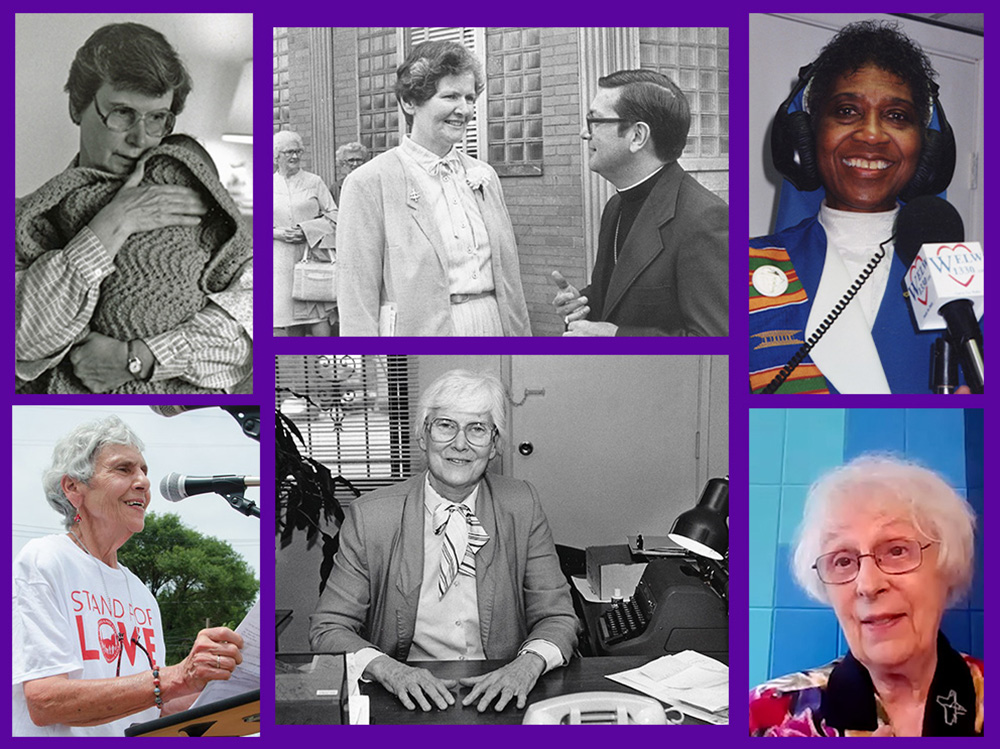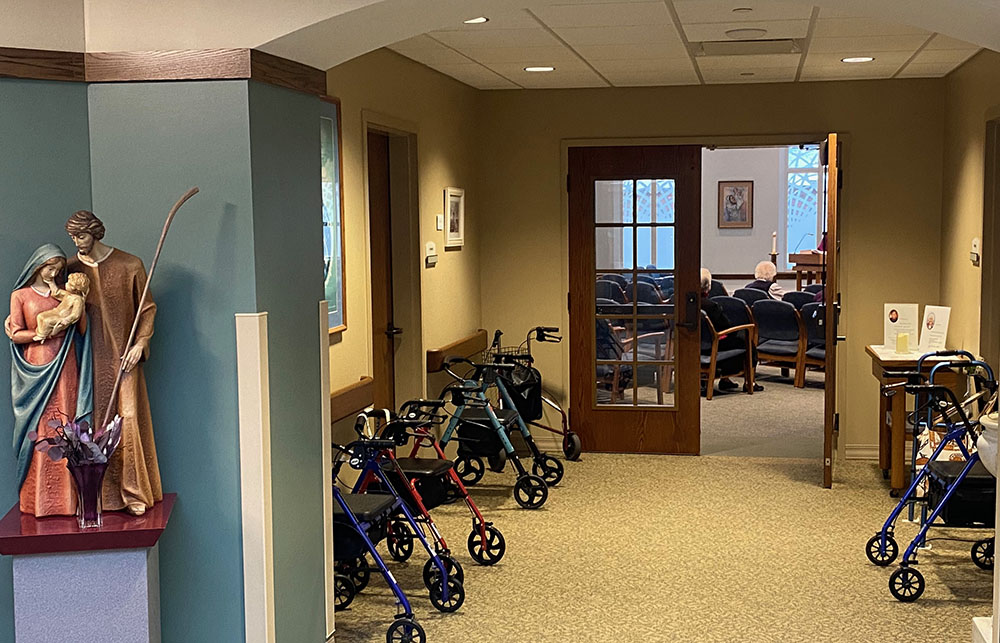
Top row, from left: St. Joseph Srs. Hope Greener, Kathleen Kilbane (seen with Cleveland Bishop Anthony Pilla), and Juanita Shealey. Bottom row, from left: St. Joseph Srs. Rita Petruziello and Loretta Schulte (photos courtesy of Congregation of St. Joseph archives); and Medical Mission Sr. Miriam Therese Winter (NCR screenshot/YouTube/Future Church).
I rarely give anything up for Lent. Over the years, I have discovered that Lent inevitably comes to me. This year was no exception.
On Mardi Gras, I underwent a total knee replacement, something I had been putting off for a while. It is amazing to this retired nurse that the procedure is now performed on an outpatient basis. I went to the surgery center at 7 a.m. and at 2:30 p.m. arrived at our Cleveland St. Joseph Center to recuperate. And yes, it hurt — a lot. But this is why God made drugs! (We love drugs.)
For the past three weeks, I have been gimping around with our senior sisters, each of whom is dealing with diminishment and the frailty of aging.
Theirs are the sister-shoulders on whom I stand.
Sr. Hope Greener — now 94 — started Cleveland's Providence House, a crisis nursery for babies who had prenatal exposure to crack cocaine, at a time when medical personnel feared these infants would face lifetime delays. Thankfully, the medical personnel were wrong, but the agency grew from a tiny house serving one or two infants to a national leader in child abuse prevention and now serves 30 children and their families at a time.
With two now-deceased sisters, 95-year-old Sr. Loretta Schulte started one of the first transitional housing programs for homeless women in the United States. It, too, became a national model.
Advertisement
Sr. Ann Kilbane was among the first parish life administrators in Cleveland. She raised tens of thousands of dollars to repair and maintain an inner-city parish that serves hundreds of refugees from all over the world.
Sr. Kathleen Kilbane was one of the first administrators of the West Side Catholic Center, which assists needy with food, shelter, clothing and a path to self-sufficiency. Kathleen was also the founding director of Seeds of Literacy, a free and easily accessible adult literacy program.
For decades, Sr. Juanita Shealey provided spiritual nourishment to Clevelanders through weekly television and radio broadcasts. Sr. Rita Petruziello directed the spiritual care department of an inner-city hospital for many years before founding a cutting-edge spirituality center at our Cleveland Center.
Their stories and those of so many of my sisters are worthy of columns of their own.
But now many of my sister-"sheros" are living with diminishment, declining cognition, impaired hearing and difficulty ambulating. My sisters manage their transitions with varying degrees of equanimity. It is difficult to adjust to a less active life. Some are occasionally crabby while others exude a mysterious peace. A few seem restless and need to be in constant motion.
We are accustomed to doing great things for the people of God. It can be hard to not be at the forefront of ministerial action anymore.
The essence of Lent is stripping away everything that is not needed for our spiritual well-being.
Even so, a spirited sense of humor is never in short supply around the dinner table. One octogenarian reflected, "We are a bunch of characters. It is funny how all of our idiosyncrasies have stayed with us our whole life and are still there."
To which another sister wryly observed, "Yep, I think we are a bunch of deluxe mixed nuts."
I laugh along with everyone else. Yet inside, I quietly wonder about my own diminishment. What will it be like? It is a question I have successfully avoided until now. (Did I mention that it is Lent?)
On Sunday, as I sit in chapel with my senior sisters (whose rollators line the hallway), I find myself filled with a surprising peace. Surprising, because as in inveterate overachieving enneagram three (a person who wants success at all costs), it is hard to value my days if I'm not accomplishing something amazing every 20 minutes.
But for the past three weeks, I have done pretty much nothing but eat, sleep, pray, read and be cared for by the most loving assisted-living staff on the planet. A compulsive caregiver, I rarely allow anyone to take care of me. I realize this is the source of my peace. I am being loved and cared for, for my own sake. Wow. It is a stunning metaphor for God's care that doesn't require any achievement or accomplishment from me.
The essence of Lent is stripping away everything that is not needed for our spiritual well-being. It is not suffering for its own sake, but it helps us see that we are loved for our very being rather than for what we have, or what we have done.

The doorway to the chapel at Cleveland St. Joseph Center (Christine Schenk)
The nature of God is love. Jettisoning nonessentials can turn our inner lens to the center, where we are deeply loved and eternally reside — free of charge — with the Source of our being, who is the Source of all Being.
Which brings me to one thing more. This Lent, I accompany a lifetime sister friend who is now in hospice care. I am her power of attorney. An unexpected blessing of my recovery time has been the ability to visit her every day. One day, after informing her many friends that she was in hospice, she humorously complained: "When your friends find out you are dying, they all want to come and visit." Her calendar quickly filled with luncheon visits, most of which she has been able to enjoy.
Then there is the death thing. Neither one of us is looking forward to that part, although my friend is not afraid. We live each day, sharing stories of past adventures and trying to be trustful and grateful. I helped her figure out to whom to bequeath her few small treasures and she has her funeral plans well in place. On days when she doesn't show up for breakfast, everyone says a prayer that the day won't be too difficult.
So, this Lent, I am thinking a lot about diminishment, life and death. These are not scary or morbid thoughts. It is a reality I am sustained in facing — for my friend and for myself — because of a deep-inside, totally undeserved awareness of being loved by the Source of my Being, our dearest God, who knows how to make my inner desert bloom.
In 2014, a beloved Medical Mission Sister friend, Miriam Therese (MT) Winter, lost her lifetime sister-companion, Mary Elizabeth Johnson. Many of today's sisters grew up listening to MT's Scripture songs and later feminist music. She is a gifted musician and an extraordinarily creative theologian.
MT composed the hymn "We Are One" for Mary Elizabeth. I think it reflects both the hopes — and the fragility — of many sister-elders as we wend our way to God.
The last verse is especially representative:
I am in you are in me, we are one.
Wonderful has been the journey. Regrets? There are none.
Now and forever: love everyone.
Love — real love — remains when our days are done.Love everlasting remains when our days are done.
Being is what we become when doing is done.








